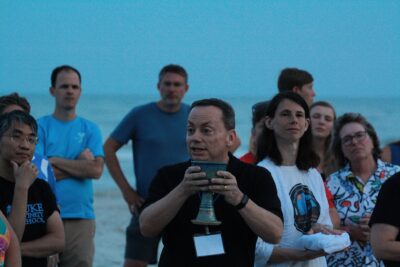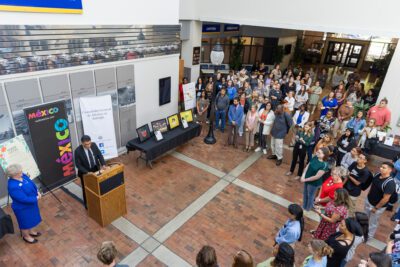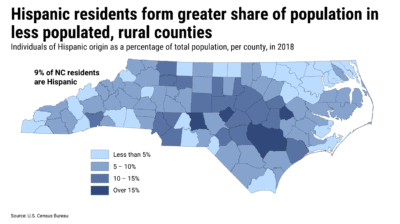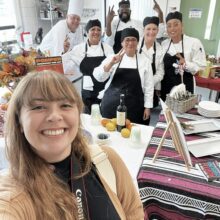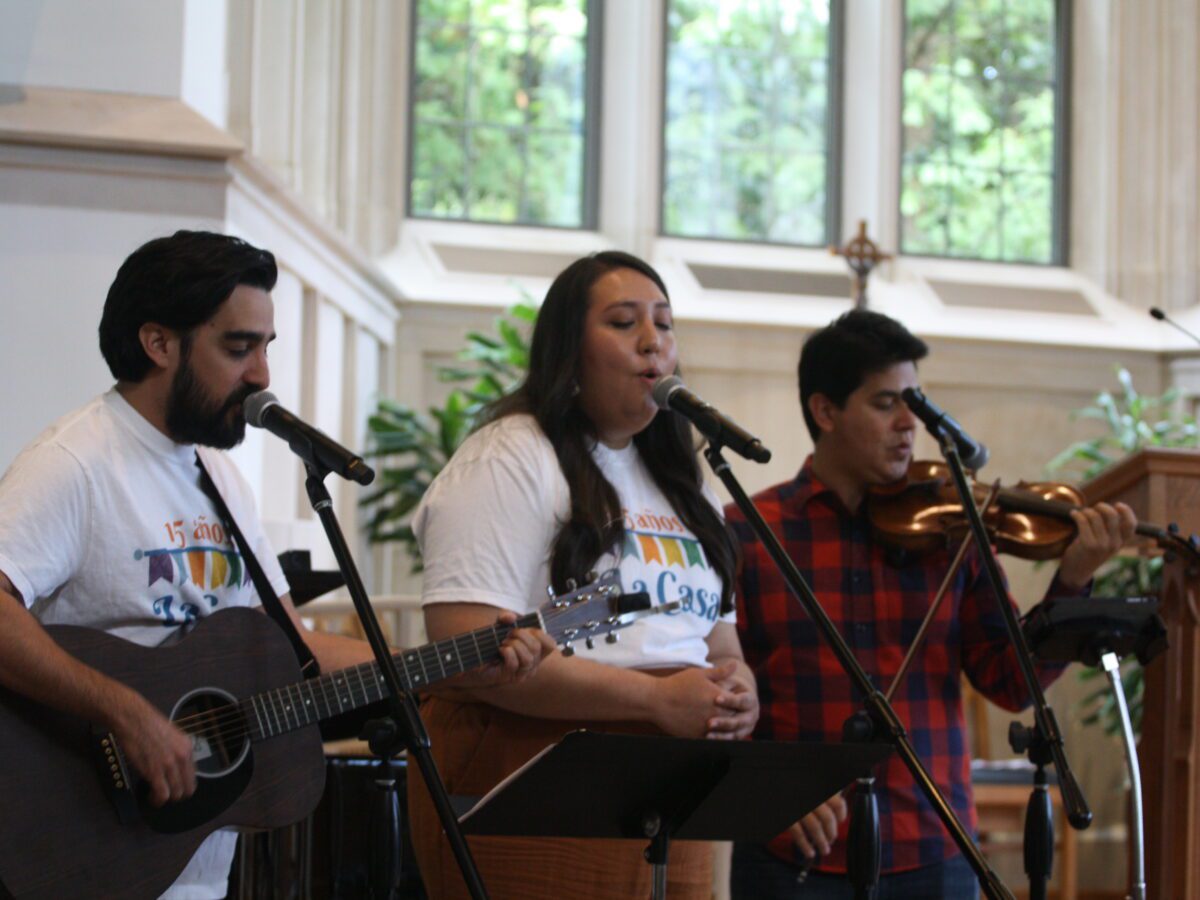
Share this story
- Duke Divinity School students, faculty, and alumni gathered last week to celebrate the quinceañera of its Hispanic House of Studies (HHS) — formed in 2007 to better serve the state's growing Hispanic population. @DukeDivinity
- "La Casa for me was like a home away from home,” a former @DukeDivinity student said. “I really enjoyed my time and professors and education. But without this house, I don’t think I would have made it, to be completely honest. So I’m extremely grateful.”
|
|
Duke Divinity School students, faculty, and alumni gathered last week to celebrate the quinceañera of its Hispanic House of Studies (HHS) — the 15th birthday of the resource center — with worship, a mariachi band, and giant tres leches cake.
The HHS was formed in 2007 by Duke Divinity, the Duke Endowment, and the North Carolina and Western North Carolina Conferences of the United Methodist Church in recognition of the need to better serve the state’s growing Hispanic population. Today, Latinos are the fastest-growing population in North Carolina, making up about 11% of the population.
On Oct. 12, in honor of the anniversary and Hispanic Heritage Month, Duke Divinity celebrated the history and impact of the HHS — affectionately known as “La Casa” by students and faculty.
“The construction of this house is not done yet,” said Dr. Alma Tinoco Ruiz, director of HHS and assistant professor of the practice of homiletics and evangelism.
Duke Divinity School Dean Edgardo Colón-Emeric said the day — and La Casa itself — was all about fiesta, or celebration.
“For the last 15 years, the Hispanic House has been helping our community do three things: Announce fiesta, anticipate the day of the great fiesta, and adore the Lord of the fiesta,” he said. “Fiesta announces that life and reality at their very core are good and beautiful.”
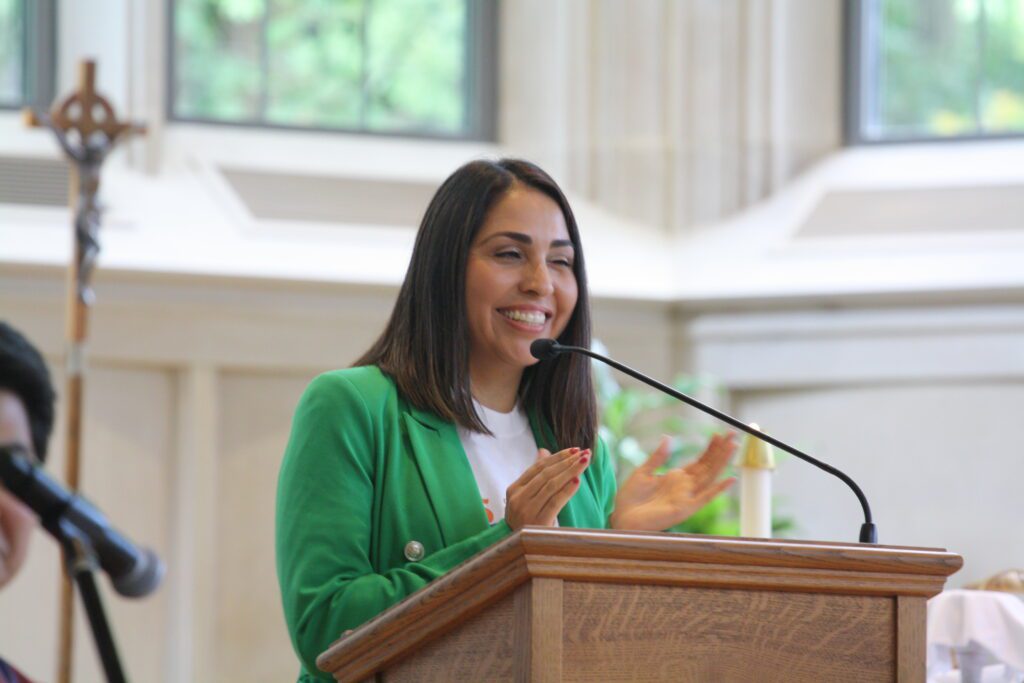
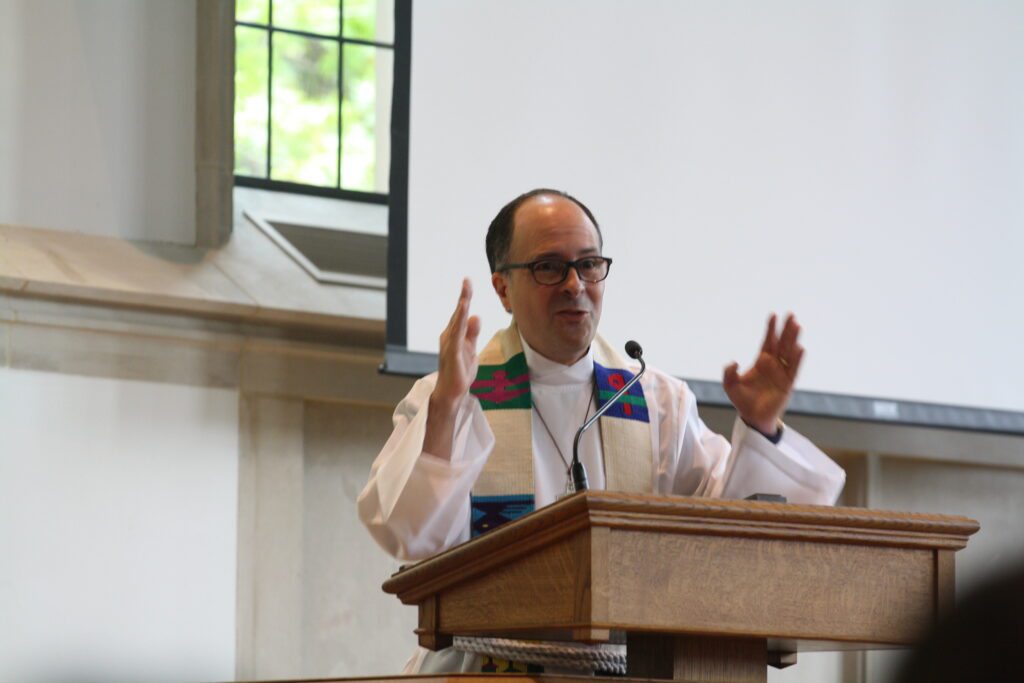
Importantly, Colón-Emeric said, fiestas do not always feel welcome.
Five hundred and thirty-one years before the Oct. 12 celebration, on Oct. 12, 1492, explorer Christopher Columbus completed his journey across the Atlantic Ocean and landed in the “New World.”
“The day of discovery for some,” Colón-Emeric said, “was the day of disaster for many.”
Following Columbus’ 1492 arrival, many Indigenous populations in America were violently exploited and uprooted from their homes and ways of life by European settlers. As a result, many states — including North Carolina — have started celebrating Indigenous Peoples’ Day on Oct. 12 to “honor and recognize our nation’s first inhabitants.”
Violence and greed exist today, too, Colón-Emeric said. Because of such a reality, he said, fiesta exists in a liminal space. But celebrating, and celebrating together, is crucial, he said.
Colón-Emeric also used the metaphor of “section rehearsals” to speak to the importance of different people living with, and learning from, one another.
In a chorus, section rehearsals are workshops or practices meant for one specific voice section, such as the sopranos, altos, tenors, or basses.
“For most of us, all we have ever known is section rehearsals in the United States,” he said. “One part has been prominent for so long, that the other parts have only survived through section rehearsals.”
In light of such a reality, section rehearsals are important. They can help many people find their voice, he said, and strengthen their sense of worth.
But, he said, the future cannot be found in section rehearsals. Resources like the HHS, he said, help train students to sing together — some more softly, and others more strongly.
“It was only as I left the security of my section rehearsal and learned to listen to different voices and parts around me that I truly learned my part,” Colón-Emeric said. “The future is harmony. The future is a great choral concert. The future is the day of the great fiesta. And I believe the purpose of the Hispanic House of Studies cannot be understood apart from this future.”
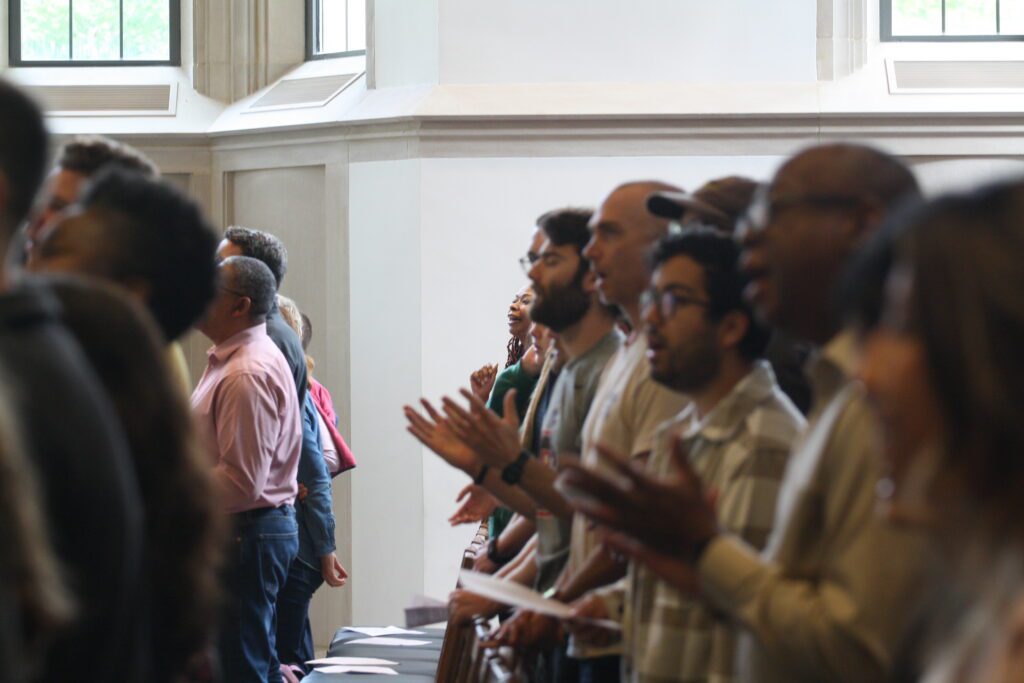
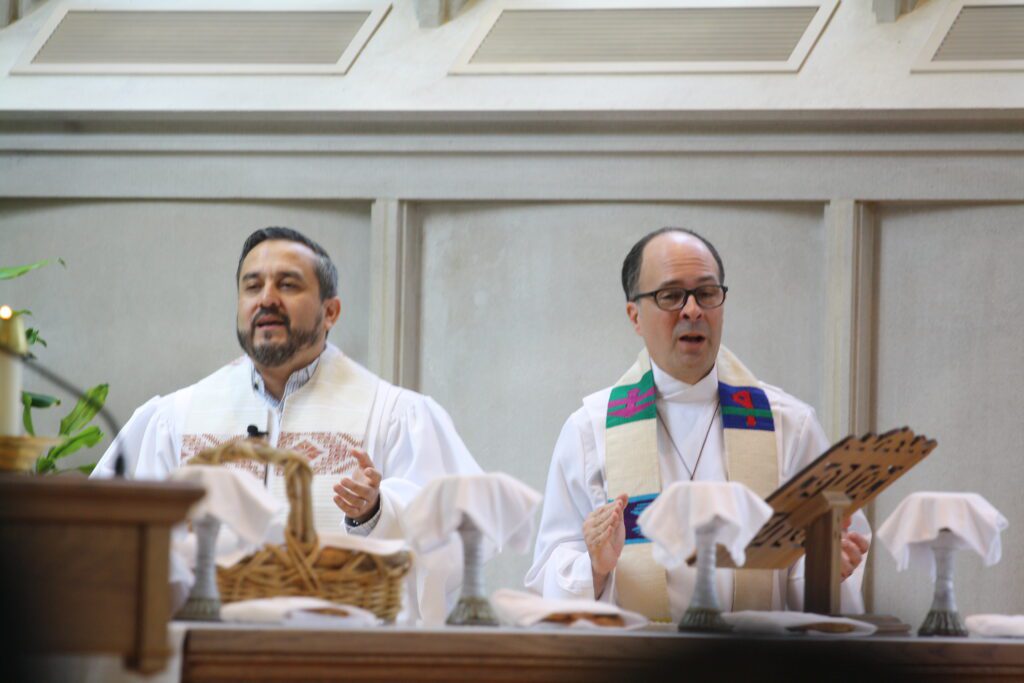
Leader: El Espíritu de justicia nos guía. / The spirit of justice guides us,
People: Blessed be the God who liberates us into new life.
Leader: Porque somos un pueblo jubiloso. / Because we are a joyful people,
People: We celebrate the presence of God within us.
Leader: Porque somos un pueblo con un corazón de servicio. / Because we are a people with a heart for service,
People: We celebrate the presence of God within us.
Leader: ¡Dios camina con su pueblo! / God walks with God’s people!
People: Alleluia and Amen!
Excerpt from the Oct. 12 Call to Worship, adapted from “Llamado y a la Adoración” by Daniel Guerrero
Listen to the worship team’s performance of “Santo,” or “Saint.”
Importance of these resources
HHS seeks to build capacity for Christian students, pastors, and congregations doing ministry with the Hispanic community across the U.S.
In addition, the HHS participates in the formation of future Hispanic/Latinx and non-Hispanic/Latinx church leaders who are committed to the community and dedicated to be self-aware leaders who can thrive in a diverse context. The HHS is committed to equipping and accompanying these church leaders as well as congregations of all backgrounds and traditions on their journey to becoming the church Christ has called us to be—a place of unity, transformation, reconciliation, and holistic healing.
Duke Divinity School’s HHS website
The HHS offers several opportunities for students and community members.
- A certificate in Latinx Studies.
- A Latinx Studies Fellowship for residential students, which includes a full-tuition scholarship, mentorship, and personal and professional development.
- “Caminantes” is a group that meets weekly “for spiritual formation from a Latinx perspective. Together the group reads the Bible, discusses texts emerging from the Latinx community, and worships with local Hispanic/Latinx congregations.”
- The Hispanic-Latino/a Pastoral Initiative, which offers theological training in Spanish.
- The Hispanic Summer Program, which “offers students the opportunity to take an immersive three-credit graduate course in a small-class setting and participate in a variety of community-building activities.”
- The “Sumérgete” Retreat is an annual retreat for pastors in ministry with the Latinx community. Attendants spend a weekend in April sharing in worship, praise, and theological reflection.
- The Course of Study in El Salvador “is intended to establish a more regular theological education for the Methodist Church in Central America.” The three-year Spanish program is intended for men and women who desire theological education but are unable to attend seminary.
During a luncheon panel about the future of theological education, current and former HHS students spoke about the importance of such resources.
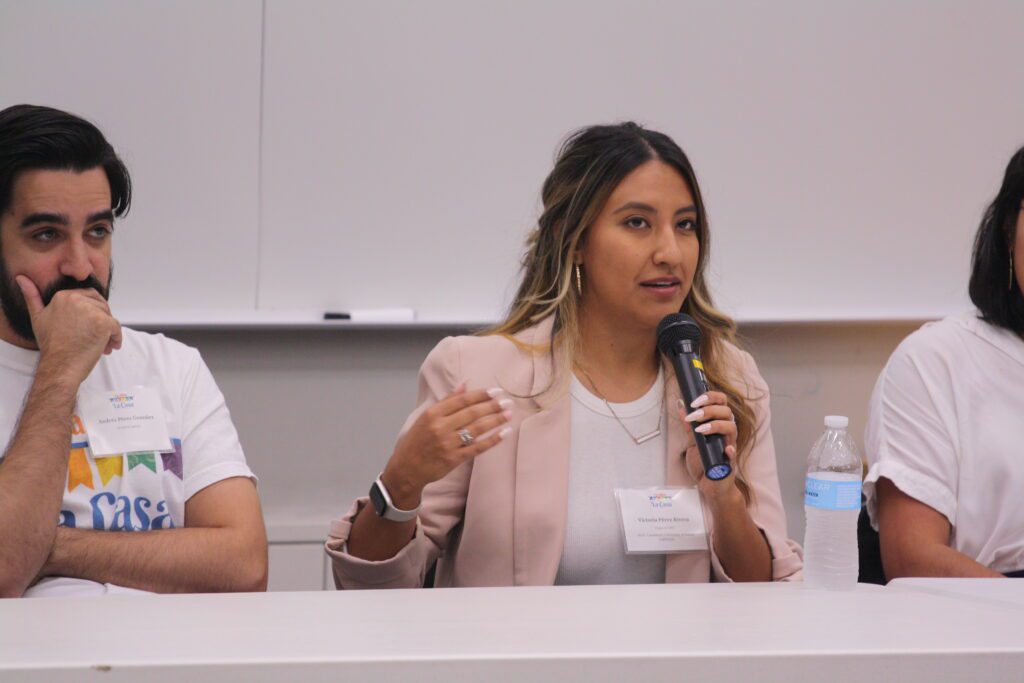
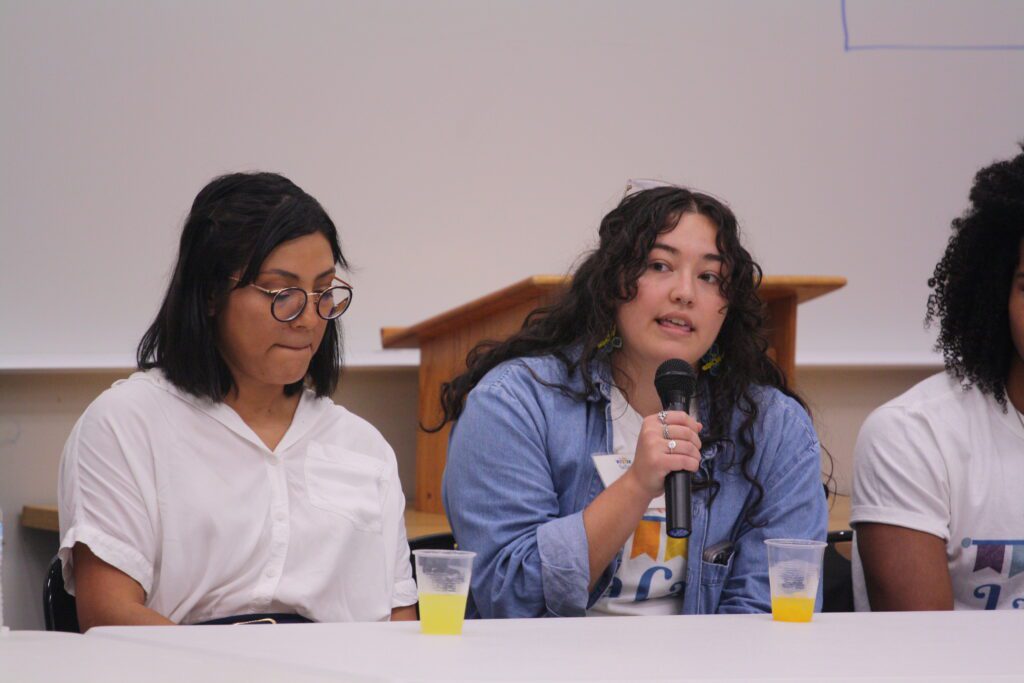
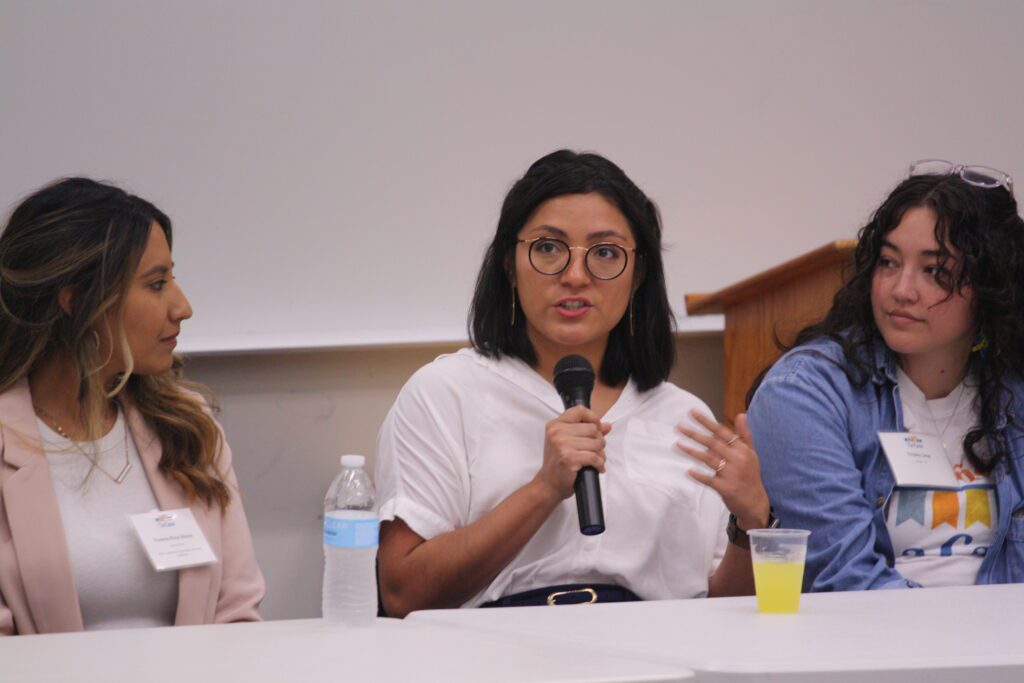
Victoria Pérez Rivera, a Ph.D. candidate at the University of Southern California and adjunct Bible professor at Latin American Bible Institute College, earned her master’s degree in theological studies from Duke.
She was born and raised in southern California and experienced a “huge culture shock” upon moving to North Carolina.
“La Casa for me was like a home away from home,” she said. “I really enjoyed my time and professors and education. But without this house, I don’t think I would have made it, to be completely honest. So I’m extremely grateful.”
Katherine Guerrero, who is currently working on her Ph.D. at Yale University, was born in Peru and moved to the United States when she was 15 years old. For her, the HHS offered a place to help process her own experiences while also learning from others.
In the future, she hopes to see more people embrace Latinx theology.
“The Latinx space of how to do theological conversations can teach so much to theological education as a whole,” Guerrero said.
Trinity Long, from Southern California, is a second-year M.Div. student and Latinx Fellow at Duke Divinity. After attending undergrad in Texas, she realized that sometimes “to survive, you forget who you are.”
Duke Divinity — and the HHS — has helped her to explore the complexities of her identity.
“I can proudly say that I am Latina, and that being a fourth-generation Mexican American, I’m going to have a different experience, but I’m also on the frontier of what it means to try to keep the culture in a society that tells you to let it go,” she said. “La Casa has been my family.”
Behind the Story
This story is a part of EdNC’s faith work. If you’d like to share your faith story with us, reach out to hmcclellan@ednc.org.
Recommended reading
